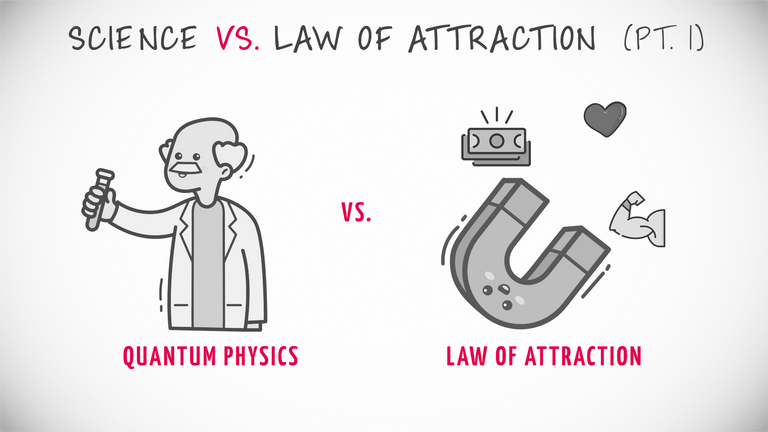
“Dad, I’m fed up with this Law Of Attraction crap.”
Emma had been struggling lately. She wanted to win a modeling contract, but it went to someone else. She tried selling her own NFTs, but didn’t break even on her investment. She wanted to get a role in a movie, but hadn’t heard back since her audition. So I figured I’d take her for a drive to Niagara Falls, since the beautiful scenery, cascading water, and fresh air always cheered her up. It was quite the drive though, so I threw on some tunes until Emma felt like talking… which was apparently, now.
“Excuse me?”
“My life’s been trash lately, nothing’s working out, if Law Of Attraction was real, I’d be crushing it.”
“Well, I’m sorry you feel that way, but you know your mother and I have never forced our beliefs on you. You’re free to believe in whatever you want.”
“Grr! That’s such a cop-out!”
“How so?”
“Because you just don’t want to prove LOA exists with –like– real science and stuff.”
“Ah yes, ‘real science and stuff’, how dare I avoid that when talking to a sulking child who hasn’t gotten her way.”
“I just–” Emma started, but I interrupted her.
“--Ah-ah. I know, you just want rock-solid scientific proof that the law of attraction is real, and you want dear old Dad to single-handedly do all the thinking for you until you’re convinced LOA is real.”
“Well, when you put it that way it makes me sound like a jerk.” Her lip folded open into a pout.
“I’m aware.” My sardonic grin was rubbing a bit of salt in her wound but I couldn’t help myself. I’d long-ago taught Emma that if she wants to understand something she has to be relaxed, calm, and open-minded, not frustrated, sulky, or whiny.
“Dad! C’mon!”
“Alright, fine, but you better remember this when I’m old and decrepit!”
“Oh, but Daddy-o, I thought you’re manifesting eternal youth.”
“Smart-ass. Do you want to know if LOA is real or not? Because if you do, we only have time for sarcastic barbs from one of us.”
“Okay, fine, please tell me…
…I’d love scientific proof for this LOA thing.”
“Well first, let me ask you this: what is science?”
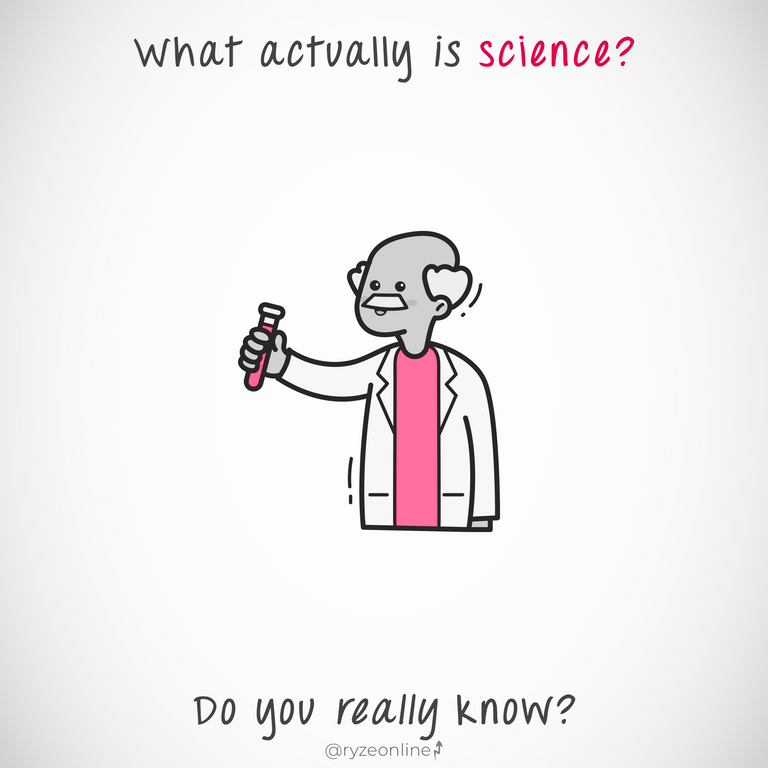
“Huh? It’s, like, labs and experiments and stuff. Math, logic, physics, biology, whatever.”
“Those are some aspects involved in science, yes, but what’s the process of science? Of creating scientific proof?”
“I don’t know, it’s like when you run experiments & calculations and end up proving some formula or result with rock-solid, total, undeniable conclusiveness. Or something.”
“You’re getting closer, but think about this list of things:
- Knowing the earth is round
- Running a 4-minute mile
- Making a heavy metal craft fly
- Holding thousands of songs in our hand
Do you know what hundreds, even thousands, of 'educated' scientists of their time said about each of these things?”
“Not really…”
“They all said --with a certainty often crossing into arrogance-- that these things were ‘impossible.’ So if science is all about rock-solid, undeniable conclusiveness, why are many scientists massively wrong about so many things?”
“Um, er, I…”
“Do you know that ‘intellectuals’ and ‘doctors’ in the medieval ages would press a sacrificed puppy or kitten onto a tumor because they thought that cancer was a ‘ravenous wolf’ that would ‘feed off the sacrificed animal rather than the human patient.’?”
“You’ve got to be making that up.”
“Nope, check out the book ‘Quackery: A Brief History of the Worst Ways to Cure Everything’ by Dr. Lydia Kang.”
“Fine but they were dumb back then, science is smarter now.”
“Is it? Because the ‘smart minds’ back then were absolutely certain they were onto the truth and ‘doing the right thing’, and that attitude hasn’t really changed talking to many scientists today, as far as I can tell. For example: One day scientists will publish a study saying that we evolved from apes. The next day, other scientists will publish a study saying we evolved from reptiles. On a third day, they’ll publish a study that says we evolved from neither. It’s enough to make one’s head spin. Most science experiments I’ve looked at have always boiled down to 'strong evidence' pointing one way, then it being disproved, followed by stronger evidence pointing another way. This happens often, with science flip-flopping direction many times over many experiments over many years. Have you talked to a self-proclaimed ‘logical’, ‘science-person’ recently? How did it go?”
“Sort of. I’ve had exes in STEM who claimed to be ‘hyper-logical’, but to me they were mostly arrogant know-it-alls. I’ve had science professors who wouldn’t let anyone question or argue with the textbook, even when my classmates were asking good questions and making real sense.”
“This often happens because our society praises logic, science, and ‘provable’ math so highly. Our society praises people who are seen to be ‘right’ and makes fun of those who dare to be ‘wrong’, for the most part. So even seemingly ‘logical’ people end up abandoning truth-seeking and true logic in favor of a pretense of logic and whatever makes them ‘look good’ or ‘wins debates’ or makes them ‘appear to be right.’”
“Including many scientists who have fears, foibles, and flaws that cause them to write things off as impossible or to attack others' work, I imagine.”
“Yes. A truly logical mind is an open-mind. If you encounter snap judgments, drastic assumption, and heavily agenda’d bias, chances are you’re not dealing with a very scientifically-minded person, at least for the moment. True scientists aren’t just able to admit being wrong, they actively seek it out, because they care about finding the truth, not about being right. Thomas Edison conducted many experiments to get the lightbulb right and delivered his famous quote that went something like:
‘I’ve not failed 10,000 times. I have not failed once. I have succeeded in proving that those 10,000 ways will not work. When I have eliminated the ways that will not work, I will find the way that will work.’
To me, that’s the approach of a true scientist, and anyone who approaches things otherwise likely isn’t really seeking the truth properly.”
“So wait, are you saying most science-peeps are lying?”
“I’m not 'saying' anything, I’m mainly asking questions and making observations, so far at least. I want to be sure you understand that for decades... science will say ‘for certain’ that Einstein was right about X, Y, and Z. Then for decades after they’ll say ‘for certain’ that Einstein was wrong about X, Y, and Z. Science loves saying things 'for certain', but the thing most people don’t like to admit is... that science & math are often far less certain than they pretend to be. They're often inadequate for explaining major truths about life. And even when they do explain something, it often takes them years to prove something that poets, artists, or mystics already ‘knew’ and are benefitting from. Even comedians ‘get this’ stuff, often on deeper levels than many scientists may ever do.”
I then broke out into my best Bill Hicks impression as I quoted one of his stand-up routines:
“The world is like a ride in an amusement park, and when you choose to go on it you think it's real because that's how powerful our minds are. The ride goes up and down, around and around, it has thrills and chills, and it's very brightly colored, and it's very loud, and it's fun for a while. Many people have been on the ride a long time, and they begin to wonder–
‘Hey, is this real, or is this just a ride?’ And other people have remembered, and they come back to us and say, ‘Hey, don't worry; don't be afraid, ever, because this is just a ride.’ And we… kill… those people.
‘Shut him up! I've got a lot invested in this ride, shut him up! Look at my furrows of worry, look at my big bank account, and my family. This has to be real.’
It's just a ride– But we always kill the good guys who try and tell us that, you ever notice that? And we let the demons run amok… But it doesn't matter, because it's just a ride. And we can change it anytime we want. It's only a choice. No effort, no work, no job, no savings of money. A choice, right now, between fear and love. The eyes of fear want you to put bigger locks on your doors, buy guns, close yourself off. The eyes of love instead see all of us as one.
Here's what we can do to change the world, right now, to a better ride. Take all that money we spend on weapons and defenses each year and instead spend it feeding and clothing and educating the poor of the world, which it would pay for many times over, not one human being excluded, and we could explore space, together, both inner and outer, forever, in peace.” - Bill Hicks, Comedian
“OK, um, first thank you for that incredibly accurate Bill Hicks monolog, Mr. Savant, and secondly, what am I supposed to be getting from all this… that ‘science sucks hard’?”
“No, not at all...
Science is amazing, and I’m a fan of logic, reasoning, experimentation, & the scientific method.”
“Right, but you’re saying that science isn’t about undeniable conclusiveness like I thought?”
“You tell me. Is math the path to all truth? Can it prove all the important parts of life? Is science all about undeniable proof & ego-riddled arrogance slamming down anyone who thinks differently? Or is it about gentle, open-minded exploration and experimentation? Is one version of science better than the other? Is it a blend of both? You tell me what science is to you, and then we’ll take the discussion forward from there.”
Emma’s mouth squinched to the side and her eyes rolled up the opposite direction, giving her a cute “I’m thinking” face. I tapped my fingers on the steering wheel along to the beat of Taylor Swift’s ‘Shake It Off’ while I waited.
“To me science is…
…A practical, truth-focused approach to logical answers about the world supported by strong evidence & found through experiment.
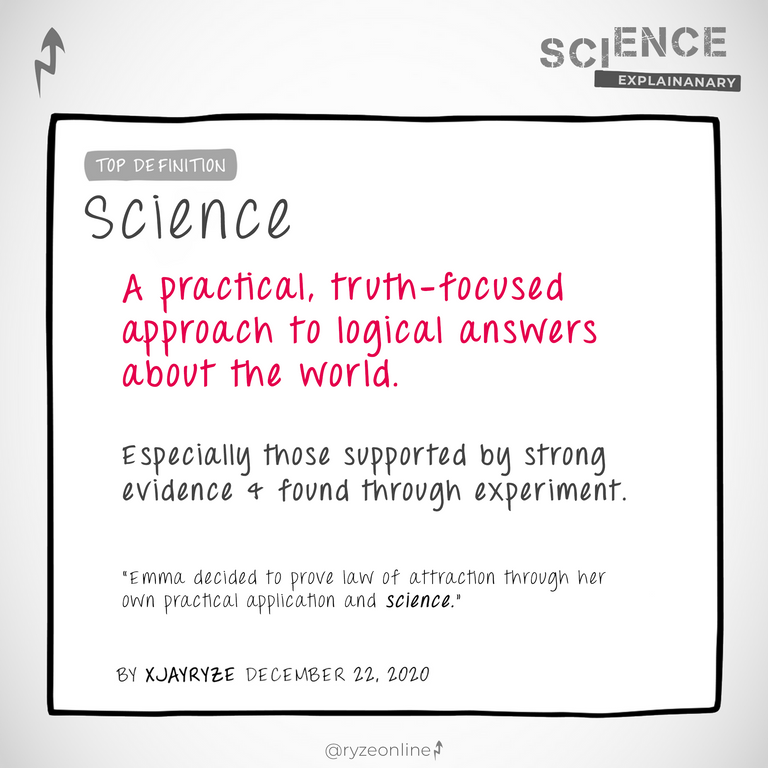
That’s why science can be wrong, or disagree, or change it’s mind over time, because even ‘strong evidence’ can be overturned with new information.”
“Fair enough, but in your definition is there room for ego? Arrogance? ‘Absolute certainty?’ Heavy-handed declarations of what’s ‘possible’ or what’s ‘impossible?’ Total undeniable evidence, as you said?”
“I guess not.”
“Good. Because it sounds like in your definition, science must be open-minded to being wrong. It sounds as if it’s open to an experiment only being 'right for a short while' until it’s disproved by even stronger evidence. It sounds as if that when scientists say ‘it’s not humanly possible to run a four-minute mile’, or ‘we can’t build a city on Pluto,’ it may only be a few decades until their rigid, overly-certain declarations are proven wrong. Am I understanding you correctly?”
“That’s the only reasonable approach to science I can think of. Anything else is just intellectual dick-measuring over ‘who is right’, just like my STEM-focused exes or my well-intentioned teachers at school, in my opinion.”
I opted not to reprimand Emma for her choice of language and continued on. “Ok, we’ll go with that then. But in that case, is it fair to ask for complete, total, and undeniable proof about Law Of Attraction?”
“Well, I mean, the fact that one plus one always equals two is complete and undeniable, right?”
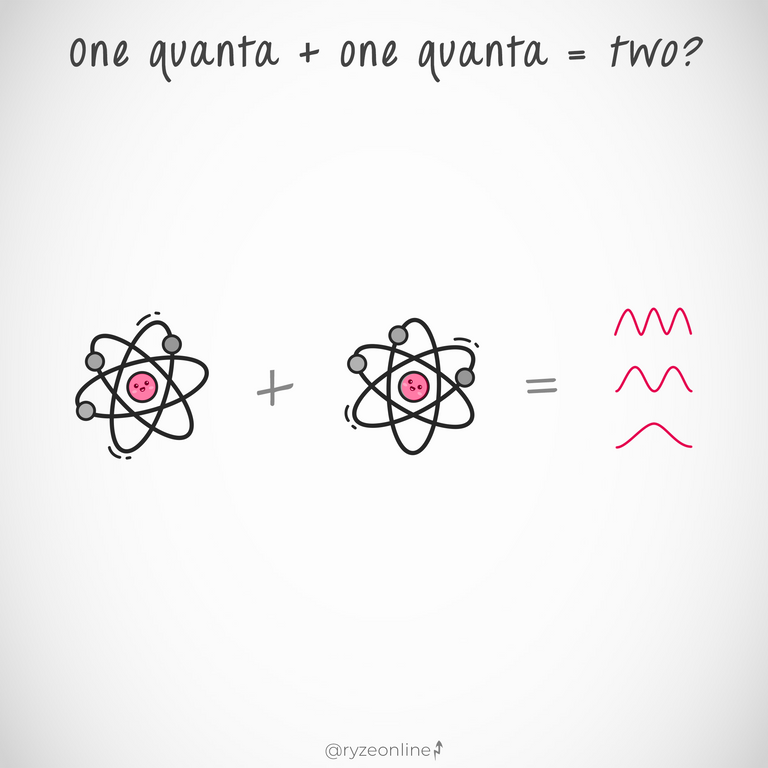
“Maybe. Russell and Whitehead published the Principia Mathematica and in it, it took them 762 pages of dense mathematical notation just to prove one plus one equals two. :
"That sounds insane."
"Kind of, haha. And besides that, you actually said that one plus one always equals two, but to properly verify that, we’d need to check whether one plus one equals two until the end of time, which we don’t have the tech to do, so all we can say for certain is one plus one equals two most of the time, so far. On top of that ‘1’ isn’t an actual thing. ‘1’ isn’t an apple, or an orange, it’s an abstract concept that someone defined, and they use it to perform functions in ‘reality’, but again, ‘reality’ isn’t properly defined either. Like, is reality a personal mental construct determined by your senses, and if so, then is reality perceived the same for everyone? And even more importantly than all this, the realms of quantum physics we’re about to explore together may actually bring other parts of this into question.”
“Are you serious?”
“Yes. No. Probably not. But maybe. Potentially–
Look, I want to be clear, I’m not the world’s smartest scientist. I’m just doing my best to answer your question about Law Of Attraction. And like a ‘true’ scientist, you may need to let go of some heavy assumptions you may have about math, nature, physics, and so on. If you’re really interested in discovering the truth, assumptions can be major obstacles that prevent it.”
“So you’re saying I can’t even assume one plus one equals two?”
“Well, try not to get hung up on that specific equation, but, kind of. What I’m really saying is that even math isn’t the rock-solid proof you’re so hungry for, even though most people who aren’t mathematicians assume it is. You may want to check out Veritasium’s video called ‘Math Has A Fatal Flaw’, it talks about how there will always be ‘true statements’ that can’t be proven, and has fifteen million views last I checked. It doesn’t necessarily mean that one plus one doesn’t equal two, but more that one should be a bit more careful trusting math to explain important or deep truths about life. One of my favorite quotes from it goes: ‘There is a hole at the bottom of math… we will never know everything with certainty. There will always be true statements that can’t be proven. Check out this interesting food for thought from a Quora post:
‘In modern quantum physics it’s commonly known that the closer we look at reality and our physical world, the more it seems as though nothing is actually here or ‘true’. A quantum particle has the ability to be existing and non-existing at the same time depending on if it is observed. Things can be True, or False and ‘True and False.’ The closer we look at quantum particles, the more we see that everything is made of nothing. If everything is made of nothing then I would say 1 is nothing, and nothing + nothing is still equal to nothing. So therefore, 1+1=0.’”
“Er, so I can’t ask for total proof one-plus-one-equals-two-style?”
“Well, in your definition earlier, you said science is about seeking strong evidence but also being totally open to that evidence being overturned… even when we’re ‘sure’ we have the ‘right’ answers, correct?”
“Hmmm… I did say that, yeah.”
“So then what are you really asking for?”
“I don’t know. This is hurting my brain already.”
“Easy, relax, my sweet girl. I think I know what you’re getting at. What you’re really asking for is for…
‘The best insight science can offer regarding the law of attraction,’ yes?”
“Yeah! Thank you! See? You get me, you totally get me.”
“My pleasure. But I may have to challenge your thinking a bit before we proceed.”
“Don’t worry, I’m beauty and brains, I’m up for the challenge.”
“We’ll see. And if you are, then ask yourself this: why do you need scientific proof so badly? Many people succeed in many activities without knowing the ‘science’ behind them. Many chefs cook masterful meals without knowing food science. Many musicians create moving concertos without knowing music theory or the math behind sound frequencies. Many ‘manifestors’ manifest wonderful lives for themselves without getting hung up on the ‘science’ of it all. So wouldn’t it be better for you to simply apply yourself to practicing Law Of Attraction and manifestation, rather than wasting your childhood years –or this car ride– on scientific study?”
“Interesting question. I just want to know. I dunno. I haven’t really thought about why.”
“Could it be because recently your life hit a rough patch, and you’re looking for a scapegoat to blame? Or could it be that you’re not great at ‘believing’ in things or trying out new ideas for yourself, so you want ‘science’ to do the heavy-lifting for you? Could it be that you want LOA to be real and true, but an attitude of doubt and skepticism is easy and familiar so you stick to it rather than something more sincere?”
“Hey!”
“Hey what?”
“Hey, those aren’t very flattering things to suggest.”
“I wasn’t trying to flatter, Em. I thought you wanted the truth, which means asking ourselves the ‘hard questions’ sometimes, right? And you still haven’t answered me, were any of my ideas the real reason you’re so ‘needy’ for scientific explanations all of a sudden?”
Emma’s shoulders deflated as she sighed. “All of your ideas are right. I hate to admit it but my gut is screaming at me saying ‘he is right and you know it,’ so there. Fine. I admit it. I have bad-faith motivations for even asking these questions. I’m frustrated and depressed and just want to poke holes in people’s chirpily optimistic Law Of Attraction crap. Are you happy now, Dad?”
I almost laughed out loud at how absurd this all was, but I felt Emma would’ve assumed I was laughing at her. It’d probably cause her to snap. So instead I did my best to reassure her that I had her best interests in mind here.
“My darling, my entire heart is focused on helping you, but to get at the deepest truths in life isn't a journey for the faint of heart, and it’s not for people who can’t even own their reasons for wanting knowledge. I’m about to spend a tremendous amount of time and energy helping you with your dilemma, and I’m not going to invest all that for someone who can’t even admit the truth of why she’s so obsessed with ‘scientific proof’ all of a sudden.”
“Ugh, do you always have to be so infuriatingly… right? God!”
I chuckled. “Like I said earlier, I’m more than happy to be ‘wrong’, because it helps me get closer to truth, but… do you really want help from someone who’s constantly wrong instead, advising you?”
“Touche. Good point. Well, as annoying as it is, thank you, I guess.”
“My pleasure. So… back to the topic at hand. We agree on what science is, at least for our chat today: Science is a practical, truth-focused approach to logical answers about the world supported by strong evidence & found through experiment. And we agree you’re not seeking ‘undeniable proof’ of the law of attraction, (because conclusions from science are continually contradicted, overturned, and generally ‘bad’ at addressing life’s deepest questions & truths) and you’ll instead be satisfied with a fairly comprehensive summary of our most up-to-date science on the matter, yes?”
“Yes!”
“Great, then let’s see how much we can help you out. One small disclaimer though: Scientific explanations are often long-winded, boring, or complex. I’ll do my best to simplify things, but that means I’ll be skipping a lot of important details, so if you really care about this stuff, you’ll have to google the scientific studies and find citations on your own, there’s plenty of them out there.”
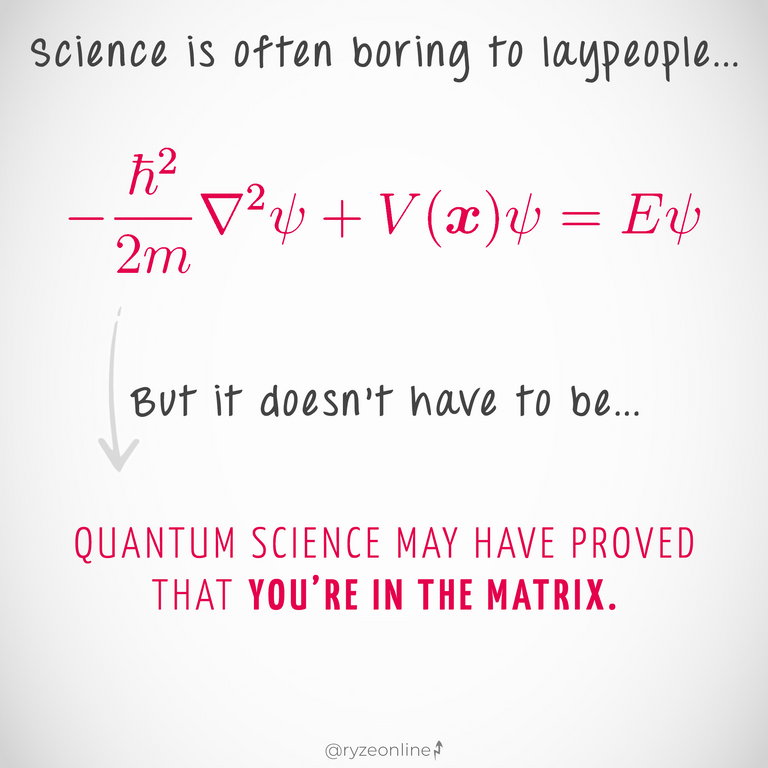
“What do you mean?”
“For example, I may quickly summarize the ‘double-slit’ experiment, and while it’s been replicated many times in many different scientific studies, there’s a lot of nuances to its discovery and the conclusions drawn from it, so my quick summary will skip a lot of details and citations, if you care about them, you’ll have to look them up and do your own research. Are you cool with that?”
“Yeah, yeah, I’ve got hands and a brain, I can google if I need to, I just know you’ll break things down easier for me, to at least get the ball rolling. What’s this ‘double-slit’ thing you’re talking about?”
“The ‘double-slit’ experiment is a cornerstone of quantum mechanics, and referred to often because of its ground-breaking implications.”
“Wait, what’s the difference between quantum physics, and quantum mechanics?”
“Quantum physics is a branch of science. Quantum mechanics is the set of principles that explain the behavior of matter and energy.”
“Oh, so quantum physics is the area of science that focuses on the principles of quantum mechanics.”
“You got it, though I, and many others, kind of use the terms interchangeably anyway.”
“Aight, I get it…
So the double-slit experiment is basically the bedrock of most quantum physics understandings?”
“Exactly.”
“Tell me about it, please.”
“Streams of ‘elementary particles’ (like photons or electrons) are fired through two very thin slits. Got it so far?”
“Sure, like firing two streams of tennis balls through slots in a wooden fence, right?”
“Basically. Plus, there's a screen behind the fence that captures the ‘impact’ of the electrons. Anyway, if electrons are particles –or ‘balls’ as you say– the experiment should show the impact of those electrons on the other side in two straight lines on the screen, right?”
“Sure, two straight lines is the only place the particles could land, that's how the slits would guide them.”
“That’s what everyone expected, but instead of two lines of impacts revealed on the screen, scientists instead saw a ‘graduated spread’ of impacts that they call an ‘interference pattern’, instead of two solid lines of particle-impacts. And do you know what this pattern on the screen means?”
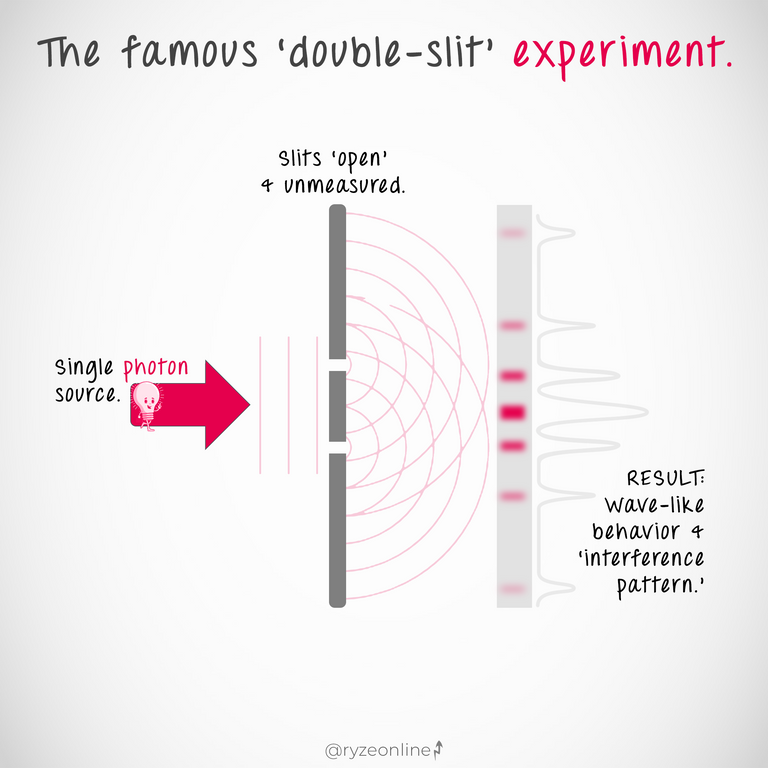
“I have no idea… something weird is going on?”
“Hah, that’s one way to phrase it. It’s kind of what eleven-year old Alice thought when she was learning about the double-slit experiment too. The ‘interference pattern’ is what you would get if you fired two bodies of water through the slits instead. It's what you'd get if you fired waves (not particles) through the slits. And the two waves would ‘blend together’ on the other side of the slit, creating ‘ripple impacts’ on the screen.”
“So the double-slit experiment proves that electrons are waves, not particles?”
“Sort of. Classical physics has long seen electrons as ‘particles’, but the double-slit experiment proves they must be waves, so science is now exploring particle-wave duality, and this particle-wave duality brings up all kinds of questions like ‘what is actually real?’, ‘is anything real?’ and ‘are we controlling reality by turning waves into particles?’ Because all this implies that there’s a ‘quantum world’ made up of waves and a ‘real world’ where all the waves have ‘collapsed’ into particles that we can measure, experience, and interact with. The experiment also suggests that us human beings, through the act of measuring, perceiving, and interacting with things are ‘collapsing’ waves from the quantum world, into ‘real experiences’ here in the real world, literally creating our own reality, somehow. We think. But science doesn’t really know why ‘measuring’ things collapses their wave-state into a particle-state instead.”
“Whoa. This got crazy deep, crazy fast.”
“Yep, but that’s what happens when you want to discuss the law of attraction, manifestation, and how it’s possible for the mind to create reality. These aren’t exactly snack-sized subjects, hon. The double-slit experiment by itself has been examined thousands of times from different angles and I can’t get into it all here, but if you want to know you may want to check out Veritasium’s YouTube again and watch ‘Parallel Worlds Probably Exist. Here’s Why’, or this summary called ‘If You Don’t Understand Quantum Physics, Try This!’ from Domain Of Science.”
“Fair enough.”
“Anyway, since this experiment, quantum mechanics now describes all ‘particles’ using a ‘wave function’, which treats everything as a wave that becomes a particle the moment it is ‘measured.’”
“Huh?”
“Classical physics says that everything is made of ‘solid particles’ that are there when we’re not looking at them. Quantum physics says nothing really ‘exists’ when we’re not looking at them. They’re just waves of probability, that ‘become real’ the instant they’re measured, observed, or interacted with. The thing is, since we live in reality, we’re always measuring, perceiving, or interacting with things, so we’re continually ‘collapsing the wave functions’ and making things real just by paying attention to them.”
“Double huh?”
“Yeah, this is really the foundation of quantum mechanics and I’m doing a terrible job at explaining it, I apologize. Let me try again. When measuring something, whether it’s as small as an electron or as big as a galaxy, our particles (and the air particles) are ‘entangled’ with whatever we’re measuring. This is called ‘environmental decoherence’, and it means that the cool ‘quantum nature’ of particles, that are ‘controllable’ by our consciousness, ‘disappears’ as soon as we put our attention on things, and those ‘waves’ instead become real, solid, particle-based experiences for us to… uh… experience.”
“Dad, you’ve explained censorship to me easily. You’ve explained ‘communication’ to me easily. You’ve explained the blockchain-game Splinterlands to me easily–”
“--But I’m failing hard here, I know. Em, I really wish there was a simple, easy explanation for these strange aspects of reality and quantum mechanics, I really do. Look, let’s try this, take a quick look at Dominc Walliman’s Quantum Physics For 7-Year Olds. The first half talks about how people feel guilty for ‘not understanding’ things, but how we can get our understanding back on track is by stopping the conversation and asking for further clarification. He encourages us to ask questions and never feel bad for not knowing something. He also emphasizes how important it is to explain things simply for others and the importance of ‘good science communication.’”
“OK, he definitely does get how hard it is for laypeople to understand science, but he also knows how to simplify and solve that. He actually started even simpler than you did. He said ‘quantum physics is the description of the smallest thing in our universe,’ even smaller than cells or atoms. He says ‘quantum physics is the study of how these tiny things behave and operate,’ and it’s really important because the small things make up all the ‘big’ realities we experience. Quantum mechanics are the foundational rules of our universe, and they’re pretty weird rules.”
“Sure, but maybe that video wasn’t very helpful? It doesn’t explain the ‘quantum measurement problem’ I was trying to get at.”
“Well he talks about MRI machines, that might explain it?”
“Magnetic Resonance Imaging machines? I can’t recall, what did he say about them?”
“He said they make the tiny hydrogen atoms in our body ‘spin’ clockwise and counter-clockwise at the same time (which is a quantum behavior), and by doing that, they don’t really ‘exist’ anymore, which is how MRI machines can actually ‘see’ inside our bodies. This is because we’re all made of ‘quantum stuff’ or something like that. Spooky, AF.”
“Yeah, it takes a bit to wrap your head around, but if you don’t understand this, you also won’t understand the ‘Observer Effect’, ‘Quantum Entanglement’, ‘Schrodinger’s Cat’, ‘Heisenberg’s Uncertainty Principle’, ‘Superposition’, ‘Decoherence’, and more. And there’s tons of information out there on it, because quantum physics is one of the most understood, most successful scientific theories out there. It’s helped us invent computers, lasers, digital cameras, nuclear plants, and more. You —and everything around you— is made up of quantum particles and subject to the rules of quantum physics, even if we don’t realize it. Dr. Rosenblum and Kuttner emphasize that:
'Quantum theory works perfectly; no prediction of the theory has ever been shown in error. It is the theory basic to all physics, and thus to all science…it is the most battle-tested theory in all of science. It has no competitors.' – Rosenblum & Kuttner, Quantum Enigma: the Spooky Interaction of Mind and Matter.”
“Whoa, whoa, whoa, hold on a second, you just hit me with a hundred terms that make no sense. I’m lost.”
“I know, I did that on purpose, because quantum physics is basically an entirely new language, with words that describe entirely new things. Anyone who doesn’t know the language will have a lot of trouble understanding anything useful.”
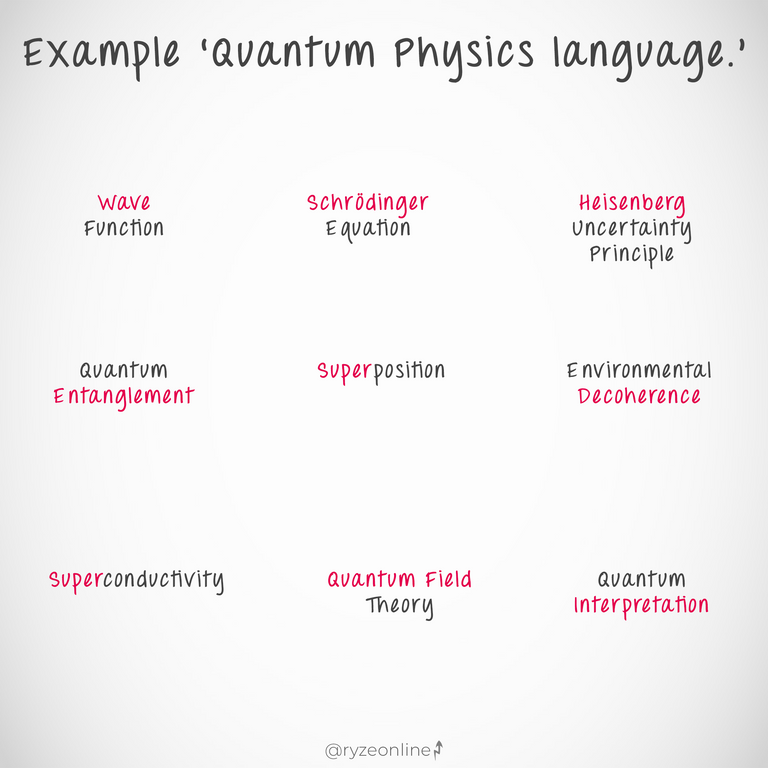
“Great, you could’ve just told me you can’t answer my question about proving Law Of Attraction in the beginning and saved us a ton of time.”
“Now, now, don’t throw a fit. First of all, we have nothing but time on this drive, and secondly I am going to answer your question, it just might not be in the way you prefer. The truth isn’t always packaged in a nice little bow or a quick sound bite from an influencer…
Sometimes, to understand the truth you have to do real, honest, mental work. You have to put in effort.
You may even have to learn a new language.”
Emma folded her arms and jutted out her chin, giving me the silent treatment.
“Em, don’t be a spoiled brat. Understanding life and mastering the law of attraction can be a game-changer, but it may take actual mental effort. Can you get on board with that?”
“Fine. I guess so. If I wanted to code a game, I’d have to learn a programming language, if I want to reprogram my life, it makes sense I’d have to do the same thing.”
“Good. That’s more like it, now I can’t teach you all these terms here and now, you’ll definitely have to look some up, but I’ll do my best. Now, do you understand that unlike classical physics, which saw everything as solid, tangible particles, quantum physics sees everything as waves, in flux, which only become ‘real, tangible particles’ once someone (an observer) takes measure of them?”
“Yeah, while you were rambling I looked at the diagrams in that video you mentioned and it helped. I think I get it.”
“Good, because that is the ‘Observer Effect.’
And it’s the basis for how we ‘create our own reality.’ Can you tell me why?”
“Because when, how, and with what attitude an observer takes stock of any ‘wave’, influences whatever kind of particle they end up with?”
“Bingo. And since we’re observing waves/particles all the time, we’re constantly influencing what happens in reality, whether we realize it or not.”
“And that’s the basic science at the core of the law of attraction?”
“Yes, that’s a big part of it. But quantum physics is a fairly new area of science, and it’s not fully proven, and there’s lots more questions and active-research going on, and people are constantly trying to ‘poke holes’ in it or ‘dismiss’ developments in quantum science, just as science once did the same thing to people exploring airplane flight, the four-minute mile, and the earth being round. Quantum physics’s connection with the law of attraction gets far more nuanced than I’ve explained here, and we can explore that if you like.”
“It sounds like there is a ‘but…’ implied here.”
“You’re right. I was going to say but…
…We can also approach LOA more from a ‘human psychology’ perspective instead of a physics-based one.
Psychology is less ‘solid’ and ‘law-based’ than physics but the patterns, trends, and conclusions that arise from scientific studies on the ‘Placebo Effect’, ‘Self-Fulfilling Prophecy’, ‘Streisand Effect’, ‘Victim Mentality’, ‘Psychological Reactance’, the ‘Pygmalion Effect’, ‘Perverse Results’ and more point very strongly towards evidence for Law Of Attraction. It’s also easier for many people to grasp. I can cite substantial studies into the power of how visualization helps athletes win contests better than those who refuse to visualize, and most people tend to ‘get it’, so it might be an easier path for you to see the proof of Law Of Attraction you asked for.”
“Hmm, but visualization doesn’t work for everyone, and it’s not totally reproducible, and we don’t know exactly how it works, it’s just a bunch of studies that show correlation, right?”
“Oooh, my daughter tossing around intellectual words like ‘correlation’, bravo.”
“Shush Dad, just because I say ‘like’ and ‘whatever’ sometimes doesn’t mean I don’t have a brain.”
“I wouldn’t dream of saying otherwise, Emma. And you’re right, like I said, psychology’s proof for law of attraction is a bit ‘less science-y’ to some people, or less ‘solid’ than the evidence that can come from physics, since physics deals with the ‘laws’ of nature, the physical world we experience, and the universe, whereas human psychology deals with the ‘black box’ of how people think, which we can’t really test and measure very accurately, at least compared to physics-based stuff. That said, although visualization was seen as ‘new age hype’ for decades, research has shown a strong scientific basis for how and why visualization works.”
“So visualization is one LOA technique that is scientifically proven?”
“Pretty much. It’s now a ‘well-known fact’ that we stimulate the same brain regions when we visualize something and when we actually experience that same thing. There’s an interesting video about Connor McGregor’s visualization techniques on ‘Mastery Blueprint’ on YouTube, and hearing his coach talk about it may interest you. Similar applies to Michael Phelps for winning his numerous gold medals in swimming. The most impressive use of visualization may be done by free-climber Alex Honnold. You could try and tell any of these massively impressive performers in their field that the law of attraction is false and visualization doesn’t work, but you’d just be a voice in their ear, while they have years of masterful performance primed by visualization arguing otherwise.”
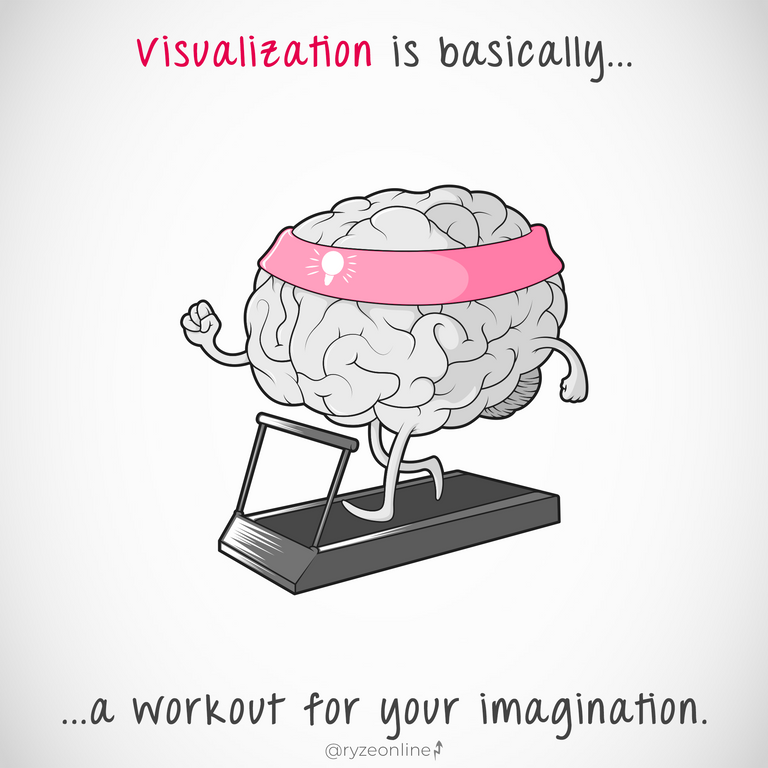
“Well then, how come my experience with visualization has sucked? I visualized getting that modeling contract and that audition, and I got nothing.”
“Oh my sweet girl, I know you want the answer to be ‘the science is wrong’, ‘the studies are wrong’, ‘the athletes are wrong’... but that’s just not it. You got no results because your visualization isn’t up to their level. You haven’t practiced it enough. You don’t do it with a wholesome attitude. Your mind is littered with doubt, cynicism, and skepticism.”
“What’s wrong with that? It’s normal to doubt and be skeptical.”
“I know my love, it is normal. But the people you look up to, and the people who succeed are not normal. They’re the opposite of normal, and they do ‘not normal’ things, such as releasing their attachment to doubt, cynicism, and skepticism. They’re open-minded and eager to give things the ‘old college try’, they’re eager to experiment, and if it doesn’t work, they’re eager to experiment again, see if they went wrong somewhere, and blame no one for their failures. They’re not looking to blame others, or blame science, or blame the law of attraction… they’re just applying themselves, practicing, and actively refining their approach til they get results. They don’t sulk, they don’t demand answers from science, they experiment with a healthy attitude, and become their own scientists. They discover subtle quirks of visualization that others don’t know, they even explore contradictory evidence for themselves by reading articles like ‘Throw Away Your Vision Board‘ by Neil Farber M.D, Ph.D, but often rather than discouraging them from visualization, it only makes their visualization practice even better. Can you honestly say you’ve been approaching your visualization with similar ‘not normal’ fervor?”
“Dang. Wow. I mean… I want to say ‘yes,’ but I’m obviously not.”
“Exactly, and the same goes for almost everyone whining about the ineffectiveness of visualization or the invalidity of the law of attraction. They’re usually people with poor attitudes, narrow minds, and ridiculously poor practice habits and personal experimentation.”
“I’m starting to see that, but honestly Dad…
…You sound kind of biased against LOA-haters yourself.”
“Owch. You wound me, Em.” I quipped as I pulled off the main road into a McDonald’s parking lot.
“Well, you have been pretty hard on me and anyone else who’s not a ‘true scientist’ in their approach to life.”
“True, but it’s not because I’m biased against them, I was one of them. I was arrogant, conceited, entitled, skeptical, cynical, bitter, resentful, self-righteous, close-minded, and more. Most cynics are not focused on value, they’re not focused on taking life forward. At least most I’ve encountered aren’t, including younger me.
‘What is a cynic? A man who knows the price of everything and the value of nothing.’ - Oscar Wilde
Although my parents were amazing, somehow I’d picked up a pretty terrible mindset for most of my childhood, and I was that way to an extreme degree. It left me homeless, isolated, broke, depressed, and suicidal. And what got me out of that dark pit was putting my assumptions away and adjusting my approach to life. I was still my logical self, and I still had a ‘healthy skepticism’, but my attitude was now much gentler, I spoke less in absolutes, I embraced gray areas, I admitted that math, science, and logic might not know everything, or even a lot, about how to navigate life successfully. I began applying myself to more practical experiments in my own life and trying ‘crazy things’ like ‘giving up’, ‘letting go’, ‘embracing death’ and other things I’d been railing against most of my younger years. I stopped caring about appearances and began caring more about what my gut, instincts, and conscience were guiding me toward. I cared more about choosing my actions out of love, rather than fear.”
“And most doubt, skepticism, and cynicism have roots in fear. Yeah, got it, I see where you’re going with this.”
“Not all, but a lot, yes. And since I’ve been the hyper-logical type for decades, and I’ve been the intuitive spiritual type for decades, I’ve now realized there is merit to both sides, and being at all closed or resistant to either is really just putting oneself at a disadvantage in life. I’m not biased against LOA-haters, I just feel it’s important to emphasize the importance of open-mindedness on either side of the ‘is LOA real’ issue, and discourage any form of dogma, ‘scientific’ or otherwise.”
“Understood, in discussions like this, I can see why you’d harp on about open-minded vs. close-minded, but can we get back to the quantum physics stuff? It was actually pretty interesting.”
“Sure, watch this while I pull into this McDonald’s and, uh, use the facilities.” I texted Emma a link to Dean Radin’s most comprehensive experiment results in his video New Experiments Show Consciousness Affects Matter ~ Dean Radin, PhD.
“Cool, I’ll check it out, do you mind bringing me some chicken nuggies?”
“Of course it's my pleasure, Em,” I said as I exited the car and started towards McDonald’s. "We'll continue our chat when I get back and discuss Einstein, Consciousness, and Parallel Worlds."
Emma's going to learn a lot more about science and law of attraction during the rest of her car-ride, but we'll take a break here and pick up our story again in part two (because Hive has a character limit on 'long' posts).
Very engaging, well-written piece. Yes, I believe that when it comes to topics like LOA, it's best to approach it with a combination of scientific scrutiny (asking probing questions and testing things out for yourself) and open-mindedness. Many people are too quick to dismiss it, but at the same time, those advocating for LOA (often those benefiting from teaching it through their books/courses) cite theories and evidence that are flimsy at best. I tend to err towards being naive and gullible, which is why now I'm taking a more scrupulous approach, and your guide is perfect! I look forward to reading more of your work.
Thanks for your kind words, and you seem to have summarized my main message quite well, bravo! The idea is to avoid hyper-dismissal, as well as avoiding hyper-gullibility. Simply keep an open mind and really, truly, experiment with it for ourselves, individually, giving it a truly 'fair shake.' I'm glad my guide was of some value to you on your journey, and there's many other 'Emma Guides' to various subjects in my archives here on Hive, wishing you lots more enjoyment and a great day! 🙏
Thank you! Yes, I'm looking forward to reading Part 2.
Enjoy! :) 🙏
Thoroughly enjoyed the read. Have a slice of !PIZZA. I'll read the rest later.
👍👍
Thank you, I poured a lot of love into writing it, I trust you'll enjoy part two, and pizza very appreciated! 🙏
This was so good and even though it's super science-y (my least favorite topic after maths) it was really easy to follow and helpful for me. I look forward to being able to send people here when they throw "but there's not Science to back LOA up so it's not real" lol!
Well done Dr. B! I love it.
mad love,
cyn
❤️❤️❤️
Glad you enjoyed it, and I did my best to actually keep it 'minimal science', you should see what 'real' scientists do when they talk about this stuff, it's complete gobbledegook for anyone unfamiliar with imaginary/complex numbers, dimensions beyond three, etc., lol.
Most people who want 'definitive scientific proof' probably aren't the type to be open to what I've written here, but fingers-crossed it helps some of them. Thanks again! ❤️🙏
which is why I usually tune out when science is discussed lol!
Same for most people, so I focused on keeping it simple. 🙏
Yay, thanks as always! 🙏
PIZZA Holders sent $PIZZA tips in this post's comments:
@wanderingmoon(1/5) tipped @ryzeonline (x1)
Join us in Discord!
🙏